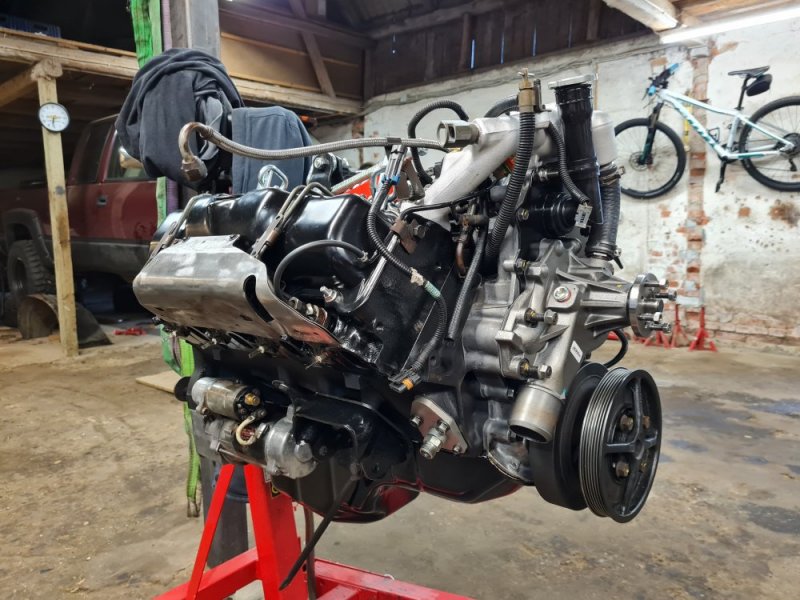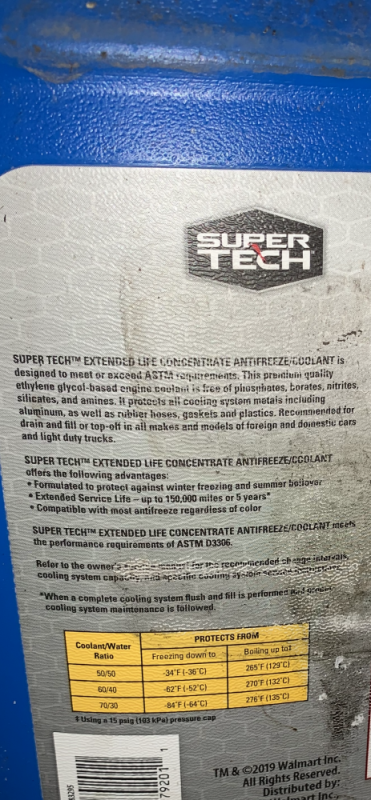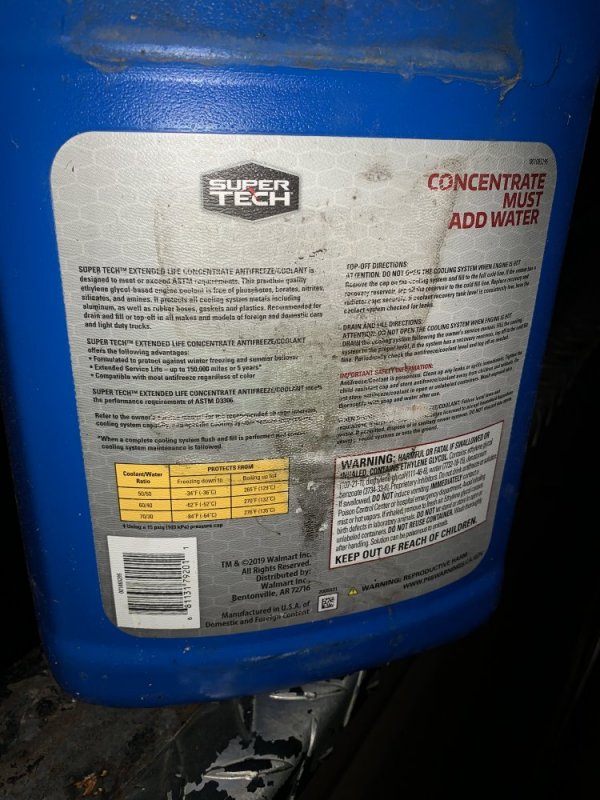Navigation
Install the app
How to install the app on iOS
Follow along with the video below to see how to install our site as a web app on your home screen.
Note: This feature may not be available in some browsers.
More options
-
Welcome to The Truck Stop! We see you haven't REGISTERED yet.
Your truck knowledge is missing!
- Registration is FREE , all we need is your birthday and email. (We don't share ANY data with ANYONE)
- We have tons of knowledge here for your diesel truck!
- Post your own topics and reply to existing threads to help others out!
- NO ADS! The site is fully functional and ad free!
Problems registering? Click here to contact us!
Already registered, but need a PASSWORD RESET? CLICK HERE TO RESET YOUR PASSWORD!
You are using an out of date browser. It may not display this or other websites correctly.
You should upgrade or use an alternative browser.
You should upgrade or use an alternative browser.
Which antifreeze
- Thread starter offiedk
- Start date
Will L.
Well-Known Member
Old school green antifreeze. Dont use the long life stuff. Doing a flush every 50,000 miles isn’t hard and is good to keep the system clean.
dbrannon79
I'm getting there!
Welcome aboard! I use regular green stuff. I'm sure others will chime in on the specifics of what to use and not to use soon.
Dexcool is a joke...I switched to it when I got my truck because I was told that's what it needed..but upon further review and conversations on here I'm dumping it out and putting regular green stuff back in it this weekend..not really sure on the brand till I get to the store but honestly I don't think it really matters on brand as long as it's not generic store brand
dbrannon79
I'm getting there!
From what I remember, use coolant that has no nitrates. and if using water wetter dont use the one for diesels. use the one for gas engines. I believe I was told nitrates aren't good for our engines
dbrannon79
I'm getting there!
@dbrannon79 Yeah I was gonna talk to a few of y'all and find out the best way to do it without it turning into a huge project....got enough of those already...lol
- Staff
- #8
It's silicates that you should avoid with diesels. Silicates are sand and other debris that present in most all green anti-freezes. Diesel engines have such high compression that anything in the coolant acts like a sand blaster from the shock wave that is emitted off the cylinder wall that it can eat a hole straight through your cylinder walls over time(this was a REAL problem on the IHI FORD 7.3L IDI engines with many succumbing to it).From what I remember, use coolant that has no nitrates. and if using water wetter dont use the one for diesels. use the one for gas engines. I believe I was told nitrates aren't good for our engines
As to which to use, I run Zerex dex-cool mixxed with distilled water in my Duramax & Tahoe. I have nothing against ELC's myself and have seen no problems with Zerex dex-cool. I will say I will NOT run Prestone as I HAVE had problems with it. Dex-cool had issues early on, but run in a closed cooling system, I feel it is excellent anti-freeze, not to mention being silicate free.
dbrannon79
I'm getting there!
@THEFERMANATOR Thank you for correcting me. I need to check the bottles on the antifreeze I used. it was the regular green stuff
dbrannon79
I'm getting there!
ak diesel driver
6.5 driver
I believe that most of the stuff available is universal and color doesn't mean much. Best thing you can do is use distilled water.
JayTheCPA
Well-Known Member
And then there is the path of the few whom use no water. Only real downside is that it gets expensive when there is a leak. The manufacturer offers free testing for helping determine when to replace.
dbrannon79
I'm getting there!
@JayTheCPA I had seen others talk about this, what is this waterless coolant?
JayTheCPA
Well-Known Member
Produced by Evans.
Pros are:
} the motor will self-destruct before this stuff boils, so in theory it can use higher temperature thermostats. But even with this, I run thermostats based on the mission and not the coolant. The selling point here is that it will resist cavitation (boiling at a set location) and continue to absorb heat rather than allow the hot-spot to continue climbing in temperature and creating a future failure point.
} theoretically long life. Have yet to have a reason for sending a batch in for testing to verify it is still good, but perhaps I should just-cause.
} no water to foster electrolysis.
Cons are:
} Expensive. Leaks are not your friend.
} not available just anywhere, so if on a road trip this can prove an issue. Theoretically it can mix with other stuff, but not for long and then it will need a purge and flush.
} will not work with some liquid cooled turbos which rely on up-welling current flow to remain cool after turning off the motor. This will coke the coolant.
Neutrals are:
} requires a purge process when converting from anything else.
} have read where the waterless coolant is not as effective in heat transfer as glycol / water. Do not have any metrics to put toward the difference. In any event, I have towed in the 15K - 16K# combined weight territory without issues.
} does not play well with all block heaters where higher wattage units will need to limit heat time in order to keep from coking the coolant. 600W heaters seem to have less concern, but 1,200+ Watt heaters will need to limit burn time. Best bet is to check with Evans for guidance.
Pros are:
} the motor will self-destruct before this stuff boils, so in theory it can use higher temperature thermostats. But even with this, I run thermostats based on the mission and not the coolant. The selling point here is that it will resist cavitation (boiling at a set location) and continue to absorb heat rather than allow the hot-spot to continue climbing in temperature and creating a future failure point.
} theoretically long life. Have yet to have a reason for sending a batch in for testing to verify it is still good, but perhaps I should just-cause.
} no water to foster electrolysis.
Cons are:
} Expensive. Leaks are not your friend.
} not available just anywhere, so if on a road trip this can prove an issue. Theoretically it can mix with other stuff, but not for long and then it will need a purge and flush.
} will not work with some liquid cooled turbos which rely on up-welling current flow to remain cool after turning off the motor. This will coke the coolant.
Neutrals are:
} requires a purge process when converting from anything else.
} have read where the waterless coolant is not as effective in heat transfer as glycol / water. Do not have any metrics to put toward the difference. In any event, I have towed in the 15K - 16K# combined weight territory without issues.
} does not play well with all block heaters where higher wattage units will need to limit heat time in order to keep from coking the coolant. 600W heaters seem to have less concern, but 1,200+ Watt heaters will need to limit burn time. Best bet is to check with Evans for guidance.
Will L.
Well-Known Member
Evans is the most popular brand.
Some love it- I don’t.
I will let them say the advantages
Disadvantages:
It does not transfer heat as quickly
It is flammable, so when it goes through your heater core if there is a leak people inside the cabin can be severely injured or killed. I know people this is happened to, So one of the big reasons I hate it.
If you chooses to run it in ANY rig you have- do not use the factory heater core system. Di not use it in something like a side by side where people are exposed to a failed hose or any part of the cooling system. Lynn Goodfellows’s mormon missle 2 had the best fire suppression system available on it, wearing all the fire gear, and still had major burn injuries with his rear engine salt flat toy. His personal compartment was separated from the engine compartment as required by the rules. This stuff is fire juice, just like your diesel fuel, treat it as such.
They have higher operating temperatures in many vehicles. I don’t care what the cooling material is, in the 6.2/6.5 Engine: 220°F means the cylinder walls are closing down on the rings and your engine is getting the hell beat out of it. I don’t care if it’s water, oil, unicorn blood- higher temp in this engine is devastating. This is part of the problem with oil based coolant not being able to transfer heat as quickly from the cylinder wall area to the coolant.
I have seen them go from saying you should run it in a sealed system, to an open system that cannot build pressure, back to a sealed system. Still experimenting after how many years? Imo, no. It simply doesn’t work well in certain applications, and they scramble for a reason it gives problems sometimes and this is one of the only variables they have to use.
Some love it- I don’t.
I will let them say the advantages
Disadvantages:
It does not transfer heat as quickly
It is flammable, so when it goes through your heater core if there is a leak people inside the cabin can be severely injured or killed. I know people this is happened to, So one of the big reasons I hate it.
If you chooses to run it in ANY rig you have- do not use the factory heater core system. Di not use it in something like a side by side where people are exposed to a failed hose or any part of the cooling system. Lynn Goodfellows’s mormon missle 2 had the best fire suppression system available on it, wearing all the fire gear, and still had major burn injuries with his rear engine salt flat toy. His personal compartment was separated from the engine compartment as required by the rules. This stuff is fire juice, just like your diesel fuel, treat it as such.
They have higher operating temperatures in many vehicles. I don’t care what the cooling material is, in the 6.2/6.5 Engine: 220°F means the cylinder walls are closing down on the rings and your engine is getting the hell beat out of it. I don’t care if it’s water, oil, unicorn blood- higher temp in this engine is devastating. This is part of the problem with oil based coolant not being able to transfer heat as quickly from the cylinder wall area to the coolant.
I have seen them go from saying you should run it in a sealed system, to an open system that cannot build pressure, back to a sealed system. Still experimenting after how many years? Imo, no. It simply doesn’t work well in certain applications, and they scramble for a reason it gives problems sometimes and this is one of the only variables they have to use.
JayTheCPA
Well-Known Member
FWIW, Ford came out with a warning about the glycol antifreeze catching fire when people tried to use the 7.3 SuperDuty as an ambulance without the ambulance package. Point is, not all coolant is immune to combustion when the system is pushed to extremes 
Will L.
Well-Known Member
Put some in a misting spray bottle of each type and spray on the campfire. One will put out the flame and the other does not, it helps the fire.FWIW, Ford came out with a warning about the glycol antifreeze catching fire when people tried to use the 7.3 SuperDuty as an ambulance without the ambulance package. Point is, not all coolant is immune to combustion when the system is pushed to extremes
Light a kleenex on fire and dump one gallon of diesel fuel on it from a pail- it will extinguish it. Doesn’t mean it isn’t flammable or dumb to p have in the cabin of the rig. This from the guy that had 1/8” fuel line into my cab for reading pressure. Did I get away with it for years and years- yup. Dumb luck.
dbrannon79
I'm getting there!
Sounds like I better stay with regular coolant and distilled water! At least for now since I’m still messing with the cooling system
Husker6.5
135' diagonal 16:9HD, 25KW sound!
I find that a 60/40 mix of unicorn pee and water is magical.
MrMarty51
Well-Known Member
Thats got My vote.I find that a 60/40 mix of unicorn pee and water is magical.
Been doing it like that for years.
The jug says 50/50, I always went 60 green and 40 water.
If a person does need to add a little water later on, it is covered. Although, I pack along a jug of 60/40 when I am on duh road.
The 60/40 will also give a lower temp freeze protection too. Lower than the 50/50.



